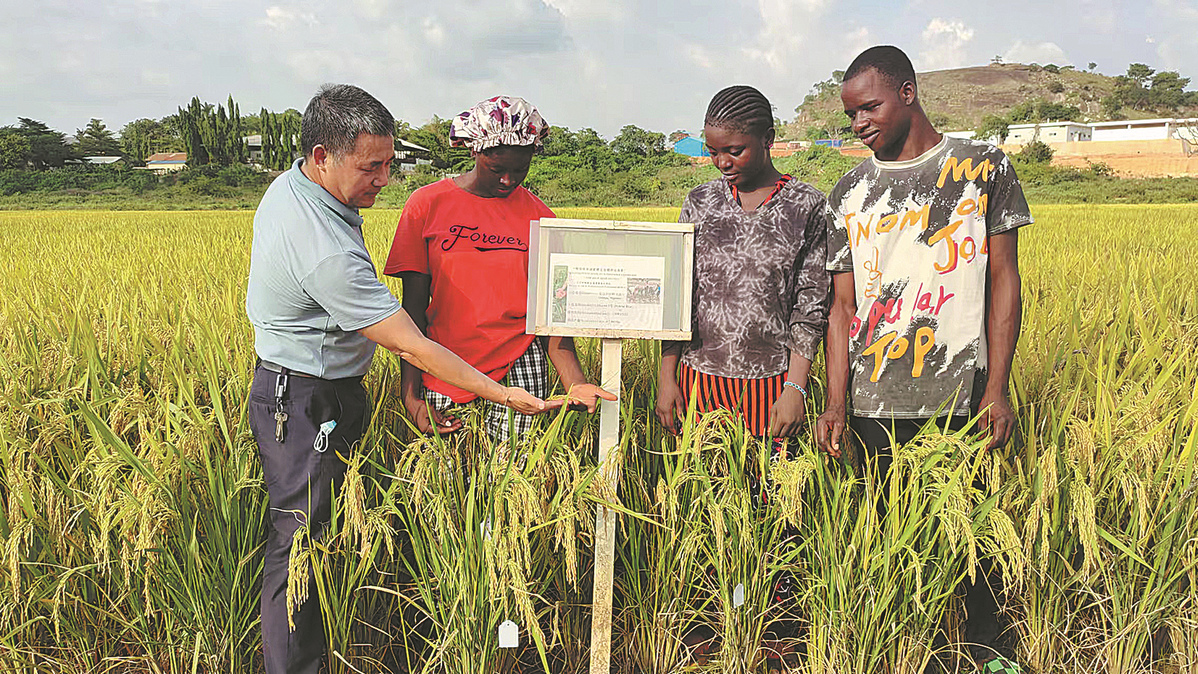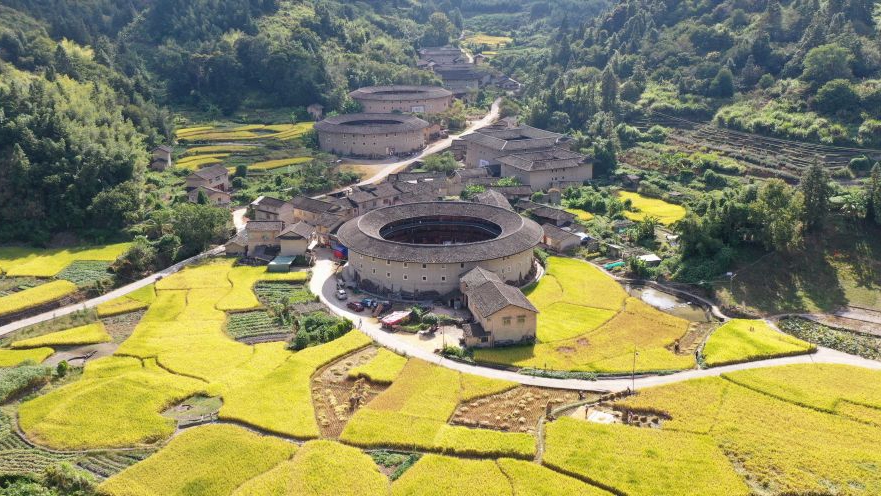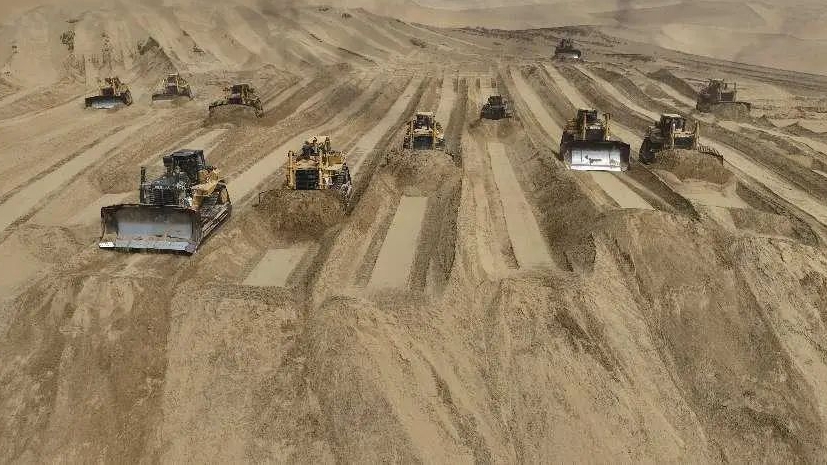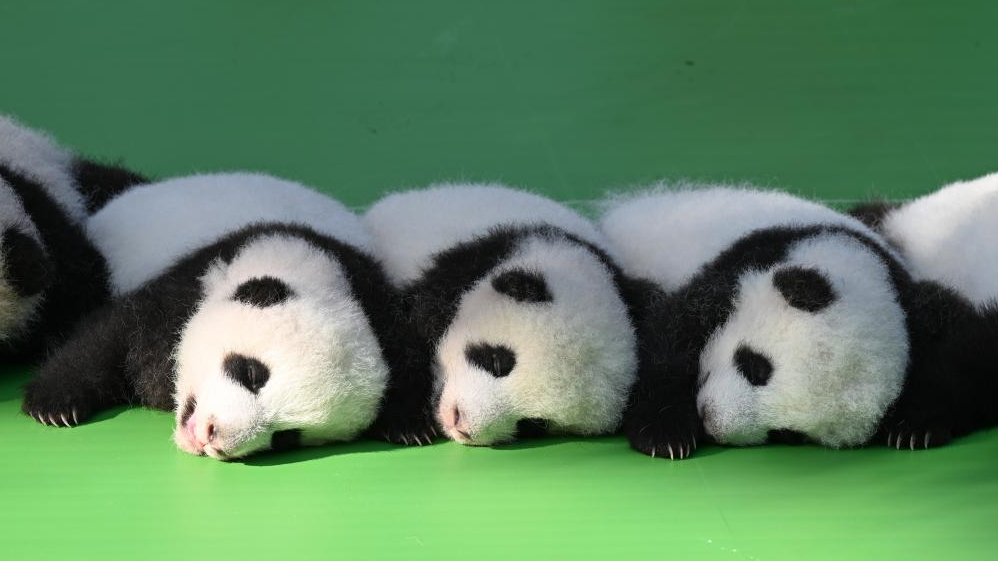Xi's vision helps address urgent global issues

A Chinese expert checks the growth of rice with farmers in Abuja, Nigeria. Rice planted at four demonstration fields all produced good harvests this year. [Photo/CHINA DAILY]
Editor's note: China Daily presents a series of analyses to explain why and how China, led by President Xi Jinping, addresses the "questions of the times" by advancing peace, progress, openness and cooperation in the world.
Answers to 'questions of the times' in interests of entire human community
In response to looming security challenges, headwinds against global recovery and setbacks to global development, President Xi Jinping brought up a number of "questions of the times" this June.
"Where is the world headed: Peace or war? Progress or regression? Openness or isolation? Cooperation or confrontation? These are questions of the times that we are confronted with," Xi said in the keynote speech at the opening ceremony of the BRICS Business Forum in Beijing on June 22.
At the forum, Xi, who is also general secretary of the Communist Party of China Central Committee, stressed the need to jointly maintain world peace and stability, promote sustainable global development, pursue win-win cooperation and expand openness and integration.
Xi's remarks help the world better identify priorities, shape agendas and deliver actions on outstanding issues such as geopolitical conflicts, the COVID-19 pandemic, food and energy crises, and economic downturns, observers said.
Over the past 10 years, led by the CPC, the country has displayed great courage, wisdom and boldness in soundly answering the "questions of the times" in a holistic manner and helping to address the world's common needs, they added.
Xi unveiled a wide range of plans and measures at a number of major international and regional events to further advance global peace, progress, openness and cooperation.
"China remains a supporter of global peace and stability as it becomes bigger and stronger, which showcases China's great sense of duty as a major country," said Parakhat Durdyev, Turkmenistan's ambassador to China.
China enjoys great potential in the economy, technology and culture, and working with China means good access to ideal cooperation for development, he added.
At the High-level Dialogue on Global Development on June 24, Xi announced that China will upgrade the South-South Cooperation Assistance Fund to a Global Development and South-South Cooperation Fund, and add $1 billion to the fund on top of the $3 billion already committed.
Speaking at the Shanghai Cooperation Organization summit in Samarkand, Uzbekistan, on Sept 16, Xi said that next year China will host an SCO ministers' meeting on development cooperation and an industrial and supply chains forum, and will set up the China-SCO Big Data Cooperation Center to create new engines of common development.
Xu Bu, president of the China Institute of International Studies, said that led by Xi, China's answers to the "questions of the times" are in the interests of the entire human community, focus on the theme of global development and lead the world's efforts in pursuing peace and development.
"Currently, human society is at a new crossroads, because geopolitical and security issues are increasingly prominent, unilateralism and protectionism are on the rise, economic globalization is suffering from headwinds and global supply and production chains witness serious challenges," he said.
Xi's remarks on the "questions of the times" constitute a Chinese solution to tackle the world's deficit in governance, trust, peace and development, and serve as part of China's contribution to boosting global cooperation on development, he added.
China is an active player supporting international development as it pushes for building a community with a shared future for mankind, basing its actions on South-South cooperation, building on the important platform of the Belt and Road Initiative and seeking to help other nations in fulfilling the United Nations' 2030 Agenda for Sustainable Development, he said.
As promoted by the BRI, East Africa now has highways, and China-Europe freight trains have become an important lifeline ensuring the stable, smooth flow of global and regional logistics.
China has signed more than 200 cooperation documents on jointly building the Belt and Road with 149 countries and 32 international organizations, Vice-Foreign Minister Ma Zhaoxu said at a news conference on Sept 29.
Jia Qingguo, director of the Institute for Global Cooperation and Understanding at Peking University, said that in the future world order, non-Western countries such as BRICS members may play a larger role in rule-making, and values such as peace, development, state sovereignty and mutual benefits are likely to get more attention.
A sustained world order requires international efforts to find ways to manage and contain divergences and to work together to address challenges to the world order. In particular, major countries need to do the right thing with a sense of foresight, courage and wisdom, Jia said.
In a prerecorded video offering congratulations on the 73rd anniversary of the founding of People's Republic of China, Maltese President George Vella noted that the pandemic "has highlighted once more the importance of multilateralism and solidarity among states".
He said it is important that more countries such as China "remain active supporters of effective multilateralism and demonstrate active respect for international law and institutions".
Wang Chao, president of the Chinese People's Institute of Foreign Affairs and president of the United Nations Association of China, said that China's answers to the "questions of the times" were based on the Chinese nation's unchanged belief in reasonably tackling differences among civilizations, seeking common ground while shelving differences, and learning from each other.
"China never subscribes to the idea that a major country should necessarily be a bully, and the nation believes that nations — whether big or small, rich or poor — are equal members of the global community and are entitled to participate in international affairs on an equal footing," Wang said.
Ren Lin, head of the Department of Global Governance at the Chinese Academy of Social Sciences' Institute of World Economics and Politics, said that facing the "questions of the times", countries should advance the joint building of the community with a shared future for mankind.
"It is important to examine deeds rather than words when evaluating whether a country subscribes to genuine multilateralism or not," Ren said. "Unlike some Western countries' hypocrisy in sugarcoating their unilateralist moves with the pretext of multilateralism, China has been practicing multilateralism with tangible actions that honor openness, inclusiveness, benefits for all and win-win cooperation."
Photos
Related Stories
- Xi congratulates Van der Bellen on re-election as Austrian president
- What President Xi prioritizes in his timetable
- Congress set to present road map for future
- President Xi's letter delivered to China Corner of Malta school
- English version of "Understanding Xi Jinping's Educational Philosophy" published
- Xi always bears Chinese people in mind
- Book of Xi's discourses on exercising rule-based governance over Party published
- Xi encourages geological workers to play greater role in mineral exploration
- Xi Jinping Thought on Diplomacy provides fundamental philosophy, guide to action for China's diplomacy in new era
- Peace and Development: Key Message of President Xi’s Central Asia Visit Before the Party Congress
Copyright © 2022 People's Daily Online. All Rights Reserved.









